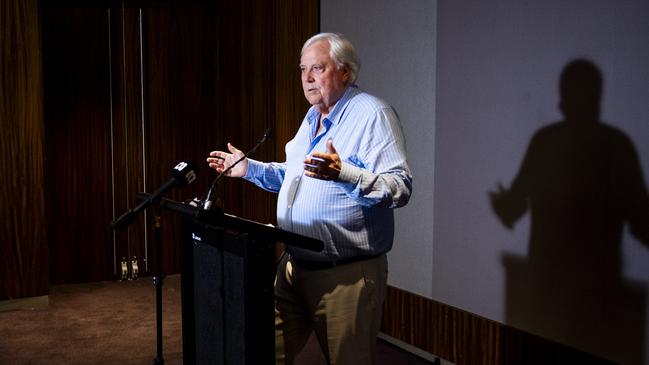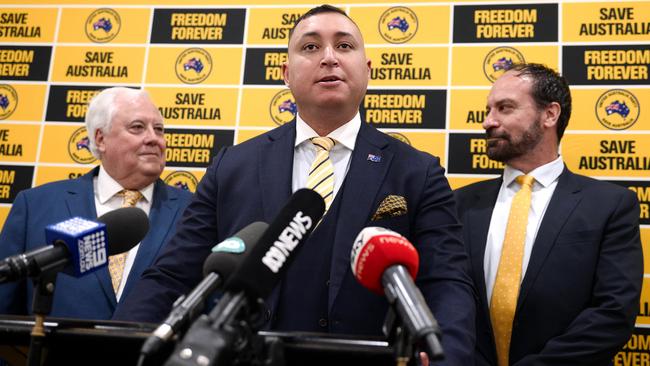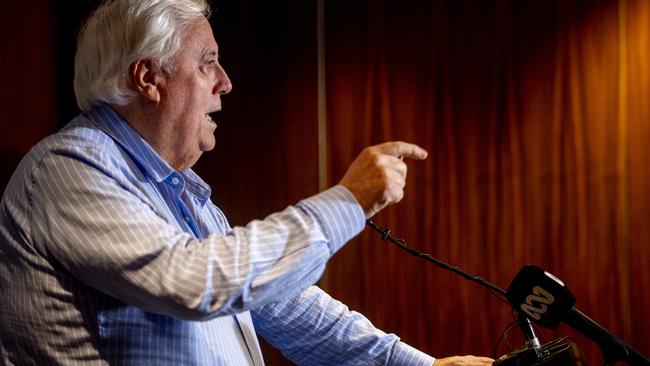‘Harassment’: Billionaire Clive Palmer’s shock claim in election fight
Clive Palmer has blasted a key Australian electoral law and compared it to those seen in Nazi Germany.
Breaking News
Don't miss out on the headlines from Breaking News. Followed categories will be added to My News.
Aussie billionaire Clive Palmer lashed the Australian Electoral Commission for “continual harassment” as he fights the ineligibility of his United Australia Party (UAP) to re-register for the next federal election.
“We’ve really got no faith at all in the Australian Electoral Commission (AEC). We think it’s just there as a smokescreen,” Mr Palmer said at a press conference announcing a donation for food insecurity.
Under the Commonwealth Electoral Act, a deregistered party cannot re-register until the election after next.
The UAP voluntarily deregistered in September 2022 due to “administrative reasons” leaving it unable to register for the 2025 ballot.
Mr Palmer went as far as comparing the electoral provisions to those in Nazi Germany, where all competing political parties were dissolved in 1933.
“If we go back in history, even in Germany, someone took power and then banned all other political parties and we know what happened [there]. That’s not a good way to run the country.”

Mr Palmer referenced the AEC’s loss of more than 1300 votes in Western Australia’s 2013 Senate election recount and the government body’s failed civil case against former UAP leader Craig Kelly after the 2022 federal election, describing it as “continual harassment.”
“It matters in principle, that people from the Labor Party, from the Liberal Party, from all parties at all different times in history, should be able to stand for election on a fair basis,” Mr Palmer said.
He added the party’s original deregistration was a “good thing because it brought this issue to the fore.”
“It could have been someone else that was affected sometime in the future, they may not have had our resources, money or ability.
“Some people are scared of the AEC, right? Most of the parliament are scared of the AEC, because that’s how they get elected.”
UAP’s fight in the High Court
The UAP have taken their fight to re-register their party to the High Court in Canberra, arguing the legislation is “unconstitutional”.
Their case seeks to establish the law as invalid, or declare it as “inoperative and of no effect to the extent it would render a party ineligible for registration for the next general election”, and is being led by the party’s sole senator and current leader, Ralph Babet.
Mr Palmer said that without registration, Mr Babet’s affected ability to run under the UAP banner in the next election sets a “dangerous precedent for the country.”

“As a sitting senator and Australian member of parliament, he can’t be recognised on the ballot like other parties to give Australians the freedom of choice,” Mr Palmer said.
“We’ve got a senator in parliament that obviously represents Victoria, he won the election.”
Why is registration important?
UAP lawyers argued in written submissions to the court that the obligation of the AEC to meet the requirements for registered officers of registered political parties include the “name or abbreviation of the registered political party, and the logo of the party, be printed on the ballot paper adjacent to the name of a candidate who has been endorsed by that party” and the ability of these details to be placed “above the line” on the Senate ballot paper.
The submissions claim that the provisions “constrain the ability” of voters to make an “informed choice, by limiting the ability to “convey and receive opinions, arguments and information concerning matter intended or likely to affect voting”.

The Commonwealth’s submissions say “it may be an advantage to be printed on the ballot paper, but that doesn’t burden the implied right to freedom of political communication”.
They argued that the UAP had offered no explanation for why a political party might voluntarily deregister and re-register in the same electoral cycle.
“Yet a possible explanation for a political party behaving in this way would be that it sought to obtain the benefits of registration (including the ballot paper benefits) whilst avoiding – for at least part of the election cycle – the funding restrictions and transparency obligations that apply to registered political parties,” the submission read.
Mr Palmer claimed he had declared “more donations than any other living Australian” when questioned about the submissions.
When contacted for response, the AEC said in a statement it “does not comment on the specifics of matters that are before the courts”.
“We look forward to the High Court’s determination of the constitutionality of the section in the Commonwealth Electoral Act that applies to parties that have voluntarily deregistered.”
Originally published as ‘Harassment’: Billionaire Clive Palmer’s shock claim in election fight




